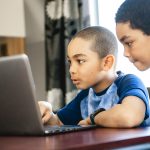The year is 2031. Children who started kindergarten in 2019 are now graduating from high school. They are entering a new world and preparing for jobs we can only imagine right now, like memory augmentation surgeons and alternative energy consultants.
Times have changed. Our world has changed.
How can we ensure that our children are prepared to thrive in this rapidly evolving, complex society? They need new skills and competencies.
Why do kids need new skills for the future of work?
In the early 1800s, Sir William Curtis declared that all children need to learn the basics, or the 3 R’s – reading, writing and arithmetic. That was over 200 years ago. While these skills are still relevant, researchers agree that they are no longer enough to equip students for a reality where artificial intelligence, virtual reality and climate change are factors shaping our world. It’s time we start thinking about skills for the future.
These skills for the future do not replace the 3 R’s, but rather act as a complement to those foundational skills. We’ve all heard of them by different names — “soft skills,” global competencies, 21st-century skills, etc. These are the skills that employers point to as the attributes that don’t just get students jobs, but that allow them to keep those jobs and advance. Most of the focus on these skills has remained in the post-secondary realm. Up until now, K-12 education has largely been outside of this conversation.
What can parents do to ensure their kids have these skills?
In the same way that kids learn subjects like math and English, skills for the future can also be taught and learned. Parents have an important role in ensuring that their children are prepared for 2031 and beyond. Here are three tips to ensure that children are future-ready:
- Starting the conversation: Parents can talk with their kids about their daily activities and help them find connections with the skills they’re learning at home and at school. For example, a child making changes to a project based on teacher feedback is demonstrating critical thinking.
- Asking questions: Parents can also start a dialogue with their child’s teachers about the skills kids need for the future (e.g. collaborating and communicating effectively) and how they are learning and demonstrating those skills. Asking questions about skills for the future can open-up new conversations with the teacher – and parents will probably even learn new things about their child in the process.
- Staying informed: The skills conversation extends to many spaces beyond the school. Parents can continue the conversation at home, in their neighbourhood and in their community. By staying updated on the latest education policies, parents can help to spread the word on these vital skills.
What’s K-12 saying about future-ready skills?
This fall, People for Education, an Ontario-based education research organization, tackled this question head-on with the launch of The New Basics for Ontario’s public education system. The New Basics capture the skills and competencies that students need to lead happy, healthy, civically engaged and economically secure lives. They are: learning to learn, thinking creatively and critically, collaborating, communicating effectively, and developing a sense of self and society. Within each of those areas, People for Education defined sets of concrete student outcomes.
Similarly, other provinces in Canada have started to talk directly about the future, and rethink curriculum, learning environments and funding structures.
New Brunswick: Starting change at home
At the beginning of October, New Brunswick’s education minister released a green paper, Succeeding at Home, detailing possible major changes to New Brunswick’s education system. The changes include the elimination of grade levels in the early grades, more use of artificial intelligence in the classroom and stronger partnerships with the private sector. The paper also emphasized job skills and providing opportunities for students to problem-solve real world situations.
Saskatchewan: Re-imagining education for all
The Saskatchewan Teachers’ Federation released a report in early November on the findings from their Re-Imagine Education initiative, Education Re-Imagined: 12 Actions for Education. The report shares feedback from a series of public consultations with key stakeholders, such as parents, teachers, caregivers, post-secondary institutions, etc. The report makes evidence-informed recommendations to refresh and restart the education system across Saskatchewan, including equipping students with opportunities to master fundamental skills so they can develop into better and fulfilled citizens.
British Columbia: Leading the way for curricular competencies
While Saskatchewan and New Brunswick have recently started this work, British Columbia introduced its redesigned curriculum in 2015. The curriculum centres on a refined list of ‘curricular competencies,’ including creative thinking, positive personal and cultural identity, and social responsibility, which span all grades and subjects. In 2017, Yukon schools adopted BC’s new curriculum for Grades 9 to 12.
International: UNESCO’s Futures of Education initiative
Re-orienting education to future-ready skills is also being discussed on a global scale. This September, the United Nations Educational, Scientific and Cultural Organization (UNESCO) launched the Futures of Education initiative. The initiative has convened an international commission of education thought leaders to consult on how knowledge and learning can affect the future of humanity and the world by 2050. UNESCO recognizes how global issues such as climate change, the rise of artificial intelligence and political extremism are shaping our future, and they see educating students to be future-ready as “humanity’s greatest renewable resource” to respond to these challenges.
How can the next generation be future-ready?
Across Canada and around the world, there is agreement that the next generation will need skills and competencies beyond reading, writing and arithmetic. Today’s students will be entering a rapidly evolving job market and society in the next 10 years, with new technologies and opportunities that we can only currently imagine. To equip students with skills for the future is a big task and everyone has a role to play, including teachers, parents, counsellors, and administrators.
Want the best of CareerWise delivered to your inbox each week? Subscribe to our popular CareerWise Weekly newsletter to receive top news and views in career development every Tuesday.





